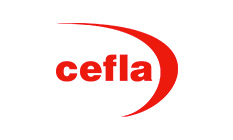For over 30 years Cefla has been working in the energy industry, building:
Cefla Engineering acts as a general contractor, able to assist clients in all phases of plant construction and system implementation, starting from feasibility studies and all the way to final testing.
In addition, thanks to its SERVICE Area, it assists clients in all phases that follow the final testing, for the years to come, with specialised maintenance and/or operating services.
Type of solutions
The decision to invest in a plant for the production of electricity, fuelled by either traditional or renewable sources, based on cogeneration or other types, requires a careful examination of the project’s technical and economic aspects.
Industrial Cogeneration
The industry requires solutions that improve market competitivity. This means plant solutions that are highly reliable and highly flexible and easy to use, as well as assuring short-term return on investments.
In this regard Cefla has developed standard cogeneration solution packages of various power generation capacities that meet as closely as possible these technical and financial requirements.
The possibility of producing thermal energy through the use of different vector fluids (steam, diathermic oil, superheated water, etc.) offers an opportunity to assess the benefits of cogeneration in various technological and manufacturing situations that have different requirements.

Cogeneration in the tertiary sector
The increased use of air conditioning and of hot water in various contexts helps make cogeneration a solution of great interest for tertiary sector projects such as:
- Office buildings
- Shopping malls
- Health-related facilities and hospitals
- Data centres
- Residential projects like DISTRICT HEATING
In such cases, cogeneration systems that produce hot water only are being used almost continuously, which translates into a very short-term return on investment, even if it requires the implementation of quite substantial fluid distribution networks.
Trigeneration for air-conditioning or cold supply chain
In many situations, heating is often limited to the winter season and is complementary to cooling energy used for air-conditioning or for specific production processes.
The use of cooling energy absorption systems makes possible the use of a cogenerator’s THERMAL ENERGY to produce COOLING ENERGY. This solution increases annual savings due to lower use of electric energy in comparison to traditional chillers.
Cefla has experience with two different kinds of solutions:
- Lithium bromide absorption refrigeration systems: a classical and consolidated technology that can be used even with no cogeneration systems (think for example of solar thermal absorbers) and useful for the production of cooling energy for keeping temperatures ranging from 5 to 7°C typically required for climate-controlled storage rooms. These systems are commonly used in tertiary sector cogeneration plants.
- Ammonia absorption refrigeration systems: making use of water capacity to absorb ammonia, they produce cooling energy fit for cold supply chains, typically used in the agro-food industry, food processing plants, but also in the petrochemical industry and manufacturing plants in general.
Heat recovery and energy efficiency
Cefla’s experience with energy production and with gas purification offers a strong combination for an accurate analysis of projects of heat recovery from hot streams such as exhaust gas from kilns and furnaces used in the ceramic, brick-making, cement and glass manufacturing industries, with the possibility of using such recovery to produce hot vector fluids or electric energy, all as turnkey solutions.
Plants based on renewable sources
Cefla builds plants that produce energy from biomass in various states (solid, liquid or gaseous) as turnkey solutions.
In recent years, Cefla has developed vegetable oil systems, biogas systems and biomass systems, being able to do that also thanks to its financial soundness, which makes it a suitable partner for large-scale projects.
Gas stream purification
The demand for ecologically and energetically sustainable industrial products, which began more than 30 years ago, has driven Cefla to identify and develop systems that reduce pollution.
Over time, the synergy among its business units, along with their specific knowledge, has helped refine and consolidate — “within CEFLA” — appropriate technologies that comply with gas emissions standards.
CEFLA is able therefore to respond to requests for purifying polluting gas streams due to either organic or inorganic substances, as well as assist in obtaining authorisations, or formally validate the system’s ecological-functional adequacy.
CEFLA uses technologies for capturing non-destructive VOCs (Volatile Organic Compounds) and for their controlled incineration. Each project is developed to optimise energy recovery. This entails the integration of the purifying plant with the pollutants producing plant.
CEFLA also builds systems for selective elimination of physical pollutants (i.e., dust) and inorganic pollutants (e.g., HCI, H2S, SOx, HF, ammonia, siloxanes) from air or biogas produced in landfills or anaerobic fermentation.
400
plants
350
plants
250
engines served
Project execution phases
The decision to invest in a plant for the production of electricity, fuelled by either traditional or renewable sources, based on cogeneration or other types, requires a careful examination of the project’s technical and economic aspects.

Energy analysis
The audit phase is of strategic importance because it offers the possibility of optimising the plant based on user consumption curves, on sampling profiles and on the availability of alternative and renewable sources.
A thorough and accurate energy audit is a key to the success of the industrial project.
For that purpose, Cefla performs the following in advance:

Project definition
Once the optimal solution has been defined, Cefla completes the entire project authorisation process and delivers to the client a turnkey system with performance warranty and maintenance service.

Plant construction
Cefla è in grado di proporsi al cliente
Further, through partnerships with major players in the energy market, Cefla can offer a client financial solutions to support the investment, or ENERGY SERVICE contracts that do not require any direct investment by the client.
Fields of expertise
This kind of approach helps arrive at better investment decisions and offers cogeneration solutions in multiple industries:
Energy and environment references

Energy / NUPI

Energy / OLIVIERI CARNI

Energy / EFFEFFE Peet Food

Energy / SACMI / industry

Energy / FLORIM / ceramic industry

Energy/ GOLD ART CERAMICHE

Energy / ACEA

Energy / SACA

Energy / GIAS

Energy / Nuova Riwal Ceramiche / ceramic industry

Kaleseramik Project

Energy / HERA DISTRICT HEATING / renewable sources

CEFLA IN EXPO

Energy / CASALGRANDE PADANA / ceramics industry

Energy / CEDIR / ceramics industry

Energy / CAVIRO PROJECT / food industry

Energy / CLAI PROJECT / renewable sources
Professionalism
The high quality of the offered product and service is the result of Cefla personnel’s long experience and extreme professionalism.
Ethics
Environmental protection, urbanisation and the growing needs of well-being and comfort compel modern engineering to adopt innovative design and construction systems that comply with eco-compatibility logic and requirements.
Quality
Complete customer satisfaction very much depends on service quality. Cefla’s Quality Assurance system governs all activities and is certified UNI EN ISO 9001:2008.










